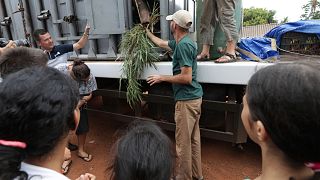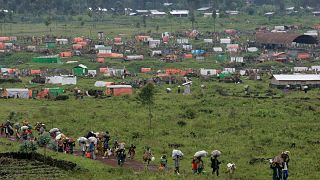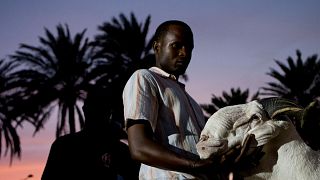Senegal
Salamba Ndiaye from Senegal has twice attempted and failed to migrate to Spain.
She has joined hundreds of others on the dangerous journey from the waters near her home to the Canary Islands.
Despite the dangers she remains undeterred. Salamba says there is nothing for her at home.
Her family, like the rest of their community in the small town of Thiaroye-sur-mer, is mostly employed in the fishing industry.
Her brother is a fisherman, and her mother cleans and sells fish brought in from sea in the market.
Fishermen in Thiaroye say they have hardly been able to find fish since the sea has been overtaken by industrial fishing trawlers, allowed to fish in Senegalese waters after several countries made fishing agreements with the government.
These trawlers dwarf the traditional fishing boats used by fishermen here, used only to catch enough fish to sell in the local markets.
Ndiaye is 28 years old and unmarried, and has dedicated herself to helping her family.
She has been studying at a local university, and she says she’s years behind where she should be and is struggling to finish her studies.
“If I had to go to school tomorrow, I wouldn't even have the money to get there,” she said.
Ndiaye says she is concerned for her mother, Fatou Niang, who is 63 years old and struggles each day to make enough money to support the family.
“My dream was to build buildings, to succeed in that and make a living. That was my goal, so that I could help my mother and help myself.”
Fatou Niang originally did not support her daughter's attempts to migrate. She fears for her daughter's life, she says, but understands why young people want to make the journey.
She says that about ten years ago fishing began to dry up.
As she cleaned fish that she would sell later in the day, she lamented the lack of work for young people in Thiaroye.
“These kids don’t know anything but the sea, and now the sea has nothing,” she said.
Ndiaye made it as far as Morocco on her second attempt, but was promptly arrested and sent back to Senegal.
Recent returnee Cheikh Gueye said the risks do not deter those willing to make the journey.
“Even if we stay here, we are in danger. If you are sick and you can’t pay for treatment, aren’t you in danger? So, we take our chances,” he explained.
Gueye is a fisherman and says he does not make enough money to get himself or his children medical care.
Not far from the beach where fishermen gather and children play, there is an empty beach littered with the carcasses of damaged boats that tried and failed to make the journey to the Canary Islands.
Those that were able to return, like Ndiaye and Gueye, are lucky.
According to a report by migration rights group Walking Borders this June, nearly 5,000 migrants died in the first five months of 2024 trying to reach the Canary Islands.
The Spanish Prime Minister Pedro Sánchez is set to visit Mauritania, Senegal and Gambia this week with the aim of curbing migration on the deadly route – but those wanting to make the trip are unlikely to be deterred.











Go to video
Nearly 200 migrants intercepted off the coast of Senegal
01:27
More than 1,200 migrants arrive in Crete amid influx from Libya
00:58
Senegalese PM Sonko says international order is shifting to a more balanced, multilateral world
01:00
Pix of the Day: July 3, 2025
01:06
China, Senegal pledge stronger strategic partnership during Beijing talks
01:43
TikTok star Khaby Lame plays soccer in Brazil after US detention